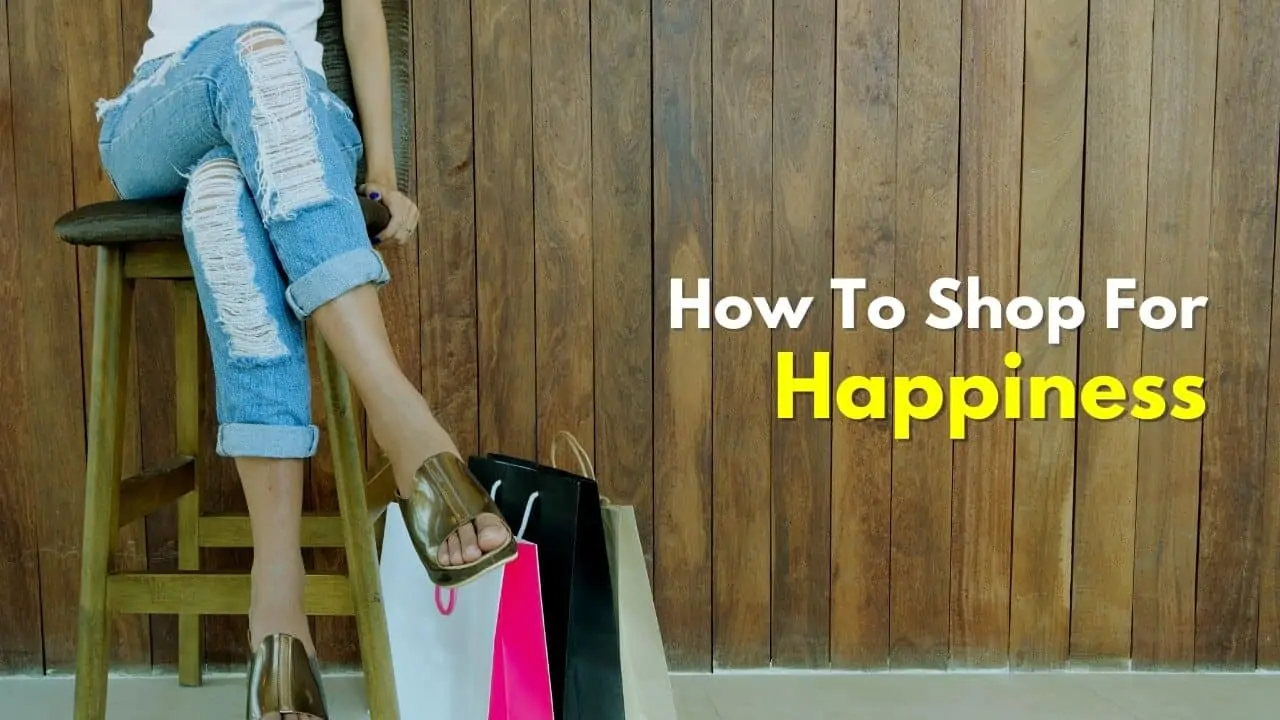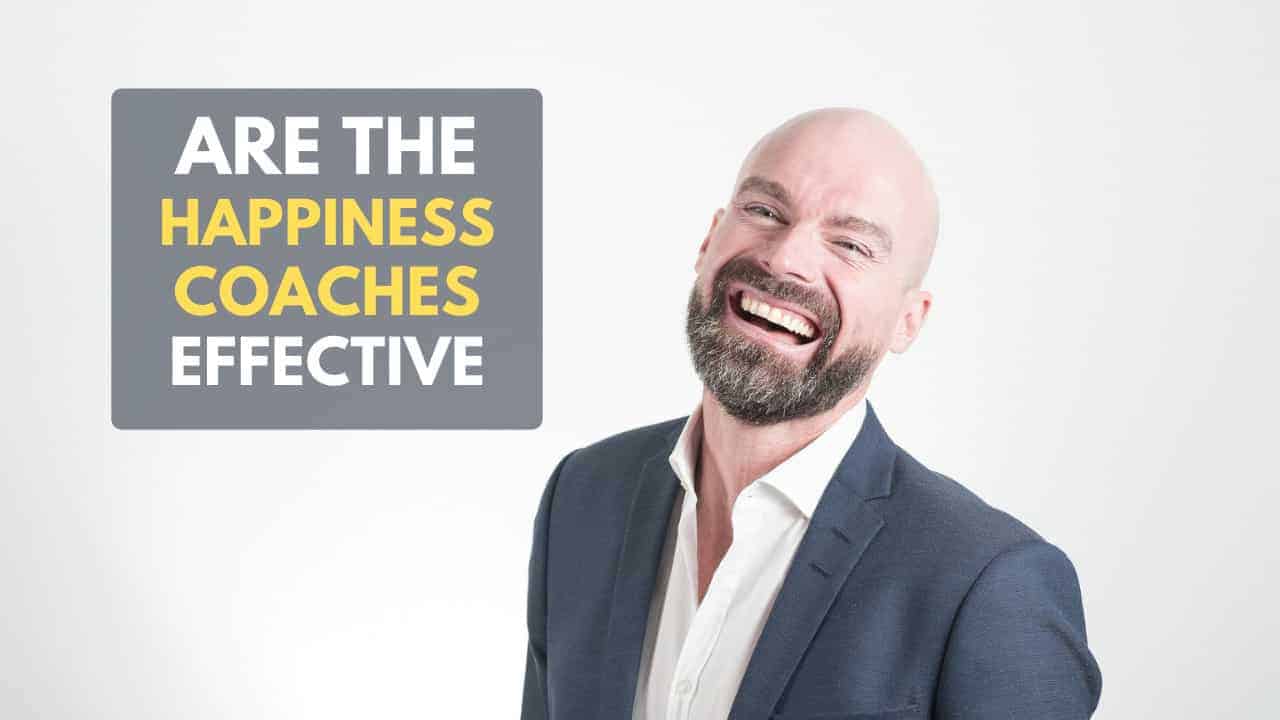“Money can’t buy happiness.”
As soon as they hear those four words, people start calling the speaker a fool, saying,
“They just don’t know where to shop for happiness!”
Now, these are the people who would most likely tell you without batting an eyelid,
“I’d rather cry in a BMW than laugh on a bicycle.”
These people mostly worry about not having the “things” that other people spend money on. Their regrets are mostly for the “stuff” they missed out on because they didn’t have enough money.
But scientists tell us that happiness depends less on owning things and more on having experiences.
Money is essential for surviving, but insufficient for thriving.

How To Shop When Shopping For Happiness?
We usually believe that buying things will make us happier.
According to research, the majority of people believe that acquiring material possessions is a good means of bringing greater happiness into their lives. 2007 (Kasser et al.)
However, buying stuff is not the right recipe to spice up your well-being. When it comes to happiness, how you spend your money is at least as important as how much money you make.
How can people who live well above the poverty line spend their money to buy happiness? How should you spend your money wisely to make yourself happier?
Here are 7 tips on how to shop for maximum happiness:
1. Buy Now, But Consume Later.
When you buy yourself an experience that happens in the future, you add to your happiness in three ways.
- First, when you’re going over the pictures and videos, plan out the perfect experience before you decide to buy it.
- Second, when you anticipate the enjoyment you will derive from the adventure, and spends days planning things.
- The third time you feel joy is when you go to enjoy the experience because it feels like you’re getting all of it for free.
Paying for an experience, and going to the experience later, takes away the pain of paying for instant pleasure.
When you use the ticket to an adventure that you bought a long time ago, you enjoy the experience more since your mind forgets the pain of paying for it.
Assume you want to book a trip to Amsterdam. When you buy it, paying for it hangs painfully in your mind.
But after some time, you start to forget the pain, as you expect it to be the most spectacular vacation of your life. It is this anticipation that is intrinsically joyful.
Finally, when you visit Amsterdam, you have the impression that you are on an all-expenses-paid vacation.
The joy we get from anticipating the future is known in French as se réjouir.
2. Buy More Experiences (Than Things).
It’s easy to spend money on things, like clothes and shoes and gadgets, and get ourselves a happiness boost.
We know well enough that these up-spikes of joy that come with a new buy do not last.
Moreover, buying things decreases our happiness.
Materialistic pursuits are linked to less life satisfaction (Richins & Dawson, 1992), psychological need satisfaction (Kashdan & Breen, 2007), happiness (Belk, 1985), and depression and anxiety (Kasser & Ryan, 1993).
Do our expectations affect our happiness? What does the research say?
Philosophers have long argued that we should spend money with the primary intention of acquiring life experiences rather than possessions. Seneca, the Stoic philosopher, said:
Again, let us possess nothing that can be snatched from us to the great profit of a plotting foe. Let there be as little booty as possible on your person.
So, what does science say about how to spend money to gain maximum happiness?
Research suggests that buying life experiences is a more cost-effective path to happiness.
Several studies have found that life experiences, rather than material possessions, contribute more to happiness (Caprariello and Reis, 2013, Carter and Gilovich, 2010, Carter and Gilovich, 2012).
In a survey of loan applicants by Dunn and Courtney (2020), more than 80% of those under 30 said they got more satisfaction after buying experiences.
They reported that spending money on experiences like trips, concerts, or special dinners made them happier than spending on things like electronics or clothes.
3. Buy Yourself Free Time.
We assume that rich people spend their time in happier ways, like living in costly apartments close to their offices.
But data shows wealthy people are busy doing things they don’t like. They spend more of their time on less enjoyable activities, like commuting and shopping (Kahneman and Krueger, 2006).
Research also indicates that higher incomes and an increased sense of time scarcity are related. So, in truth, as you get wealthier, you start to feel more pressed for time.
However, the good thing is, you can add to your happiness by buying yourself some spare time to do things you enjoy.
Recent research suggests that spending discretionary income to buy more leisure time may enhance happiness.
The study authors found that spending money on time-saving services, such as outsourcing cooking, shopping, and house cleaning, is related to better levels of life satisfaction (Whillans, Dunn, Smeets, Bekkers, 2017).
Spending money on time-saving services may feel extravagant in the current post-pandemic era, yet buying time appears to increase happiness levels.

4. Spend Some Money On Others.
A string of studies reveals that spending some of your money on someone else is more likely to make you happy than spending it on yourself.
Spending on others allows us to bask in the “warm glow” of giving.
However, the act of giving does not necessarily make everyone happy. For being happy, it is crucial that the givers feel that they made their decision freely — something they decided to do rather than being compelled to do.
The happier people have a consistent pattern of spending their income:
- After paying for the essentials, they set aside away 25% for saving or investing.
- Then they spend roughly 12% of their earnings on pro-social activities, like donating to charities or religious institutions, or buying gifts for others.
Giving generously, even if it is only a few dollars, can improve your mood, according to research.
5. Go Shopping Without A List.
A shopping list is an ideal way to avoid impulse buying. It saves time and money, and also, lets you get the most out of your shopping trip.
But what happens when you walk into a supermarket with a shopping list in your pocket?
It becomes a chase to check off the items on your list. Buying from a shopping list is a mechanical and stressful experience.
Moreover, it might add more worry if you realize your list is missing key items.
So, don’t always bother making a list. Sometimes allowing yourself to go on an impulsive shopping trip can fill you with the delights of curiosity and exploration.
It is an emotional experience when you go shopping without any prefixed plan or any plans to write down your purchases once you get home.
Impromptu shopping is mostly a lot of fun.
6. Pay For Shopping With Only Cash.
Nowadays, most people even use their phones as their wallets, with apps to make it that much easier. But is it really the better way to pay?
When you pay using a digital mode, the process is almost painless.
Using cash or bills is more difficult emotionally, but it saves you the later agony of having to settle your dues and debts.
The psychology of money says that when you pay with a credit card or a mobile wallet, you tend to spend more since you don’t feel the pain of seeing the money leave your pocket.
These “invisible” modes of payment lead you to often buy things you don’t need, which you later regret when you get home.
Remember, going cashless while shopping can deliver unbounded joy at the time of purchase, but it may cause pain later.
So, take cash (or a card with a limited amount) with you when you go shopping.
7. Never Get A Debt You Can’t Pay.
There is a dark side to money: your debit and credit card debts can quickly become crippling to your finances and interfere with your ability to pay bills on time.
As a result, you are potentially opening up to pay off the high interest on your accrued debt.
We know how financial institutions deal with debtors. You risk drawing intense suffering into your life if you do not pay off your debts to them.
As a result, never go into unmanageable debt. You may feel a surge of delight in the short term, but the long-term worry of repaying it will eventually make you worse-off.
To keep your peace of mind, one of the first things you should do is pay off your debts.

The ‘Money To Survive’ Argument
When talking about money and happiness, what most people reduce the argument to is: you can’t put food on the table, pay your rent, or afford healthcare, without money.
Those are the most basic survival uses of money, but that is not all we need to thrive.
Since happiness is a state of mind, pursuing happiness through means of money can only make us unhappy.
Let’s focus on those who have enough money to cover their basic needs, and then some. But they still feel unsatisfied and restless because they do not have or do things that wealthier people have and do.
More Shopping Does Not Assure More Happiness
Of course, more money increases our happiness, as studies keep finding. Income does have a positive correlation with happiness (Diener and Biswas-Diener, 2002). Even in 2020, people said their happiness increased with higher salaries.
However, there is a catch. Money can help afford admission into better schools, more rewarding careers, and safer residential localities, but it does not provide as much happiness as people believe.
According to surveys conducted in 19 countries, the poor are just 20% less likely than the rich to be content with their life (Diener and Biswas-Diener, 2002).
Read it as money can give us the power to control our life in terms of buying more expensive comforts and allowing pleasant activities – but only up to a point.
Once you reach that point, money stops giving you more happiness, a point called the happiness plateau.
The money that makes a person most happy is the money that keeps them out of poverty.
There’s another side to it: When we have more money, we want to buy more than we can live without. We give in to impulsive buying and enter overconsumption mode.
Overconsumption: This phenomenon is one of the main threats to the much-needed global sustainable transition. Because if everyone overconsumes, industries will overproduce. However, no one has enough resources to obtain every single product that has ever been made, so we begin to witness the accumulation of a ludicrous amount of surplus. Environmentally, this is an apocalypse scenario.
— Isil Gurmen, The Next Cartel
Final Words
Many people dream of marrying into riches. There even exists a bestselling genre of “billionaire romance” novels.
These novels allow their readers to indulge their fantasies of shopping at high-end places and being seen in opulent places. While not worrying about how much they spend in a few hours or bothering how much money they will have left after the purchases.
But, think for a while from the other side of the table: Do the wealthy feel happier than everyone else at all times? No!
Unlimited money is NOT the recipe for never-ending bliss.
Of course, more buying creates business, but it may also be a curse for our planet Earth. We must be mindful of how fast we consume resources and produce waste in comparison to how quickly nature can absorb our waste and generate resources.
Sonja Lyubomirsky, the author of The How of Happiness, warns us:
“…having money raises our aspirations about the happiness that we expect in our daily lives, and these raised aspirations can be toxic. Unfortunately, raised aspirations don’t only lead us to take things for granted and impair our savoring abilities. They steer us to consume too much, tax the planet’s resources, overspend, and under-save, go into debt, gamble, live beyond our means, and purchase mortgages that we can’t afford.”
• • •
How To Leave A Narcissist, With No Money (And Be Free)
How To Be Financially Happy (7 Habits of The Happy+Rich)
• • •
Author Bio: Written and reviewed by Sandip Roy—a medical doctor, psychology writer, and happiness researcher. Founder and Chief Editor of The Happiness Blog. Writes on mental health, happiness, positive psychology, and philosophy (especially Stoicism).
√ If you enjoyed this, please share it on Facebook or Twitter or LinkedIn.